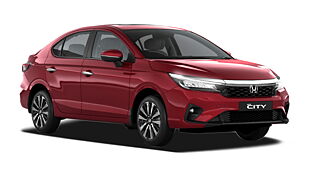Introduction

Say Honda, and three nameplates come to mind; especially if all you care about is the Indian car market. There's the City, of course. Then there's the Civic. And if you have managed to do well in life, and then some, you'd also remember the CR-V.
Furthermore, if you also happen to follow what we, the motoring journalists say, you'd know, we have been trying to launch the diesel version of the SUV in India for over half a decade. That's way before Honda even made up its mind!
Now, Honda has finally given into our demands. And it will launch the diesel CR-V in India this festive season; around October mostly. The car you see here, is that car.
Generation change

Now, we won't just get a new diesel engine, but an all-new CR-V; a new generation car if you will.
It is longer than the older model, and it sits on a longer wheelbase. It is also wider, it runs on a different rear suspension, and for the first time, the CR-V will be available as a seven-seater.
Design direction
The basic silhouette of the CR-V hasn't changed all that much compared to the previous generation car. So, it's still a tall car with flowing lines and soft edges. And, it hasn't been bulked up to look as imposing as the Ford Endeavour or the Toyota Fortuner. But, it certainly looks more purposeful and SUV-like compared to the previous generation CR-V.

It still has high mounted tail lamps, but, now these run into the tailgate much like on the WR-V and the new Amaze. The slim and long DLO continues, which has been tweaked just a little bit beyond the C-pillar. Wheel arches are still big; the lines are still clean and crisp; and even though the shoulder line has moved up and the doors are now devoid of any character lines, you still can't mistake it for anything but a CR-V.
Ditto when viewed from the front. Yes, it has more modern looking headlamps. And, the chrome grille isn't smiling anymore. Even the bumper has gained so much aggression, you'd think it needs anger management classes. But, the bottom line is, with those ridges still running on the side on the bonnet, and the overall stance and proportions, Honda hasn't veered off in a different direction from the previous generation's design language; it has just made a lane change.
Inside talk

Inside though, this new generation car actually feels like a completely different model. The steering is new and its controls are more intuitive. The instrumentation is an all-digital unit that gets a comprehensive driver information system. And, the new dash design gives the CR-V the feel of a more spacious, but functional car. Plus, the quality levels are a step up over the older car as well.
There's loads of space too; for the knee, shoulder and head included. The seats are large and cushy, but they certainly could have done with better contours. The second row of seats slide fore and aft, and also adjust for recline. The last row of seats are low and cramped. But then, that was always expected.

As far as features go, on this Philippine specific model you get a two zone climate control system, a fancy looking touchscreen multimedia system with Apple CarPlay and Android Auto, and all-digital colour display as part of the driver information system (read instrumentation). The latter throws up information like range, average fuel economy, trip readings, eco driving performance and other handy bits.
Additionally, there's keyless entry and start, usable central armrests for the front and second row of passengers, rear AC vents both for the second and third row of seats, lots of storage spaces, and an equal number of charging points. Safety wise, there's ABS, 6 airbags, autohold and vehicle stability program built in as standard.

Diesel Power

The new CR-V diesel is powered by a 1.6-litre, four-cylinder engine. And yes, the capacity does seem a bit inadequate on paper given that this Honda weighs nearly 1.7 tonnes. And the engine, with 120bhp of max power, isn't exactly very powerful either. This is a single turbo unit which is made in India. It is then shipped to Thailand where it finds its way into the CR-V, which is then imported to the Philippines.
The peak torque figure of 300Nm though, is encouraging. Having a 9-speed automatic helps too. You see, with a 9-speed gearbox, if the ratios are smartly chosen, it can help hide the lack of grunt; at least in the operating range that one most often uses. This has helped the CR-V on the road. It can comfortably cruise at 130kmph which is when the car actually shifts to 9th gear. Otherwise, it only gets up to 7th at 100kmph. It's also quiet and serene inside the cabin at these speeds. The gear shifts are seamless too, and if you choose to shift manually, there's a hint of lag in favour of reduced shift shocks.

But, 120bhp just isn't enough to give the CR-V a spring in its step. It's not slow, but it doesn't do quick overtakes or great standing starts. So, if you really like your cars peppy and alive, then the CR-V may not cut it for you. But, but, BUT, when compared with the 1.5 Honda diesel already available in India, this 1.6 is quieter, more refined and certainly more alive.The grunt aside (or the lack thereof), the CR-V is an impressive drive. It stays true and solid in a straight line; the brakes are powerful; and though the steering isn't brimming with life, it's quick and linear enough to take all uncertainty out of the driving.
The ride, meanwhile, isn't plush and you can feel the road under you at all times. There's some jiggle; road joints can be both felt and heard; and at slow speeds, the CR-V tends to roll over bumps rather than flatten them. However, the setup is more taut than harsh really. And, it never feels uncomfortable.
Competition check

When launched in India the CR-V diesel will be priced at around Rs 30 lakhs. And that puts it in the same playing field as the big and burly Ford Endeavour and Toyota Fortuner. Will the CR-V with its better road manners, a quieter cabin, and a more luxurious and comfortable motoring experience pull buyers away from the butch lot? Not really. But, there are enough city dwellers looking for exactly what the CR-V delivers. And with two extra seats and a diesel engine, Honda has just made that choice that much more tempting.
Watch out for our detailed India drive of the new Honda CR-V diesel next month.

Update
The all wheel drive CR-V
We also drove the all wheel drive version. It uses the same engine with the exact same output figures. But, thanks to the on-demand system, it is heavier. And that would mean lower fuel economy figures as well. Driving wise, there isn't a vast difference between the FWD and AWD. Like the former, the AWD is happy cruising at 120kmph; it has decent throttle response; and overtakes on the highways aren't too much of a bother.
And on twisties, even though one can feel the bulk of the car, it doesn't feel cumbersome or lethargic or boring. However, overtakes on single lane roads do require planning. Both the 1.6-litre diesel engine and the 9-speed automatic gearbox aren't the most eager. Shifting manually via the steering mounted paddle shifters improves things, but you still can't take liberties with it. This also holds true for the 2WD version, by the way.

The AWD - at least in Philippines - also gets additional equipment. It gets electric powered driver's seat, lane-assist system, adaptive cruise control, and a panoramic sunroof, all of which were missing on our 2WD test car.
Pictures by Honda Global and Vikrant Singh
Click here for our first drive review of the Honda City
Click here to read our comprehensive comparison test between the new Honda Amaze and Maruti Suzuki Dzire
Click here for our first drive review of the 2018 Honda Jazz

![Honda CR-V [2013-2018] Image Honda CR-V [2013-2018] Image](https://imgd.aeplcdn.com/272x153/cw/ec/10045/Honda-CRV-Exterior-127662.jpg?wm=0&q=80)
























